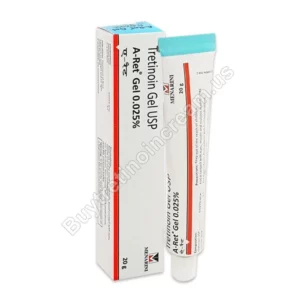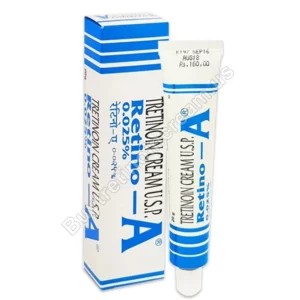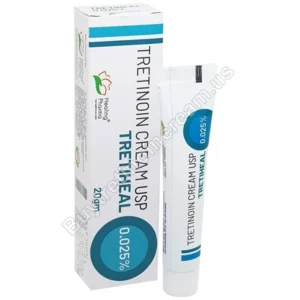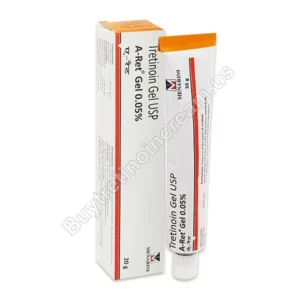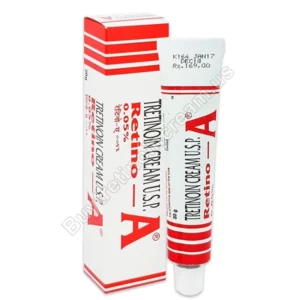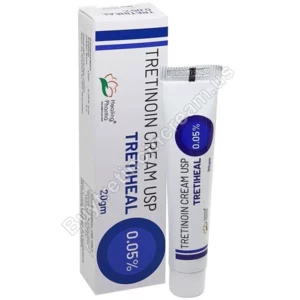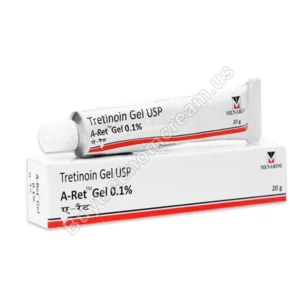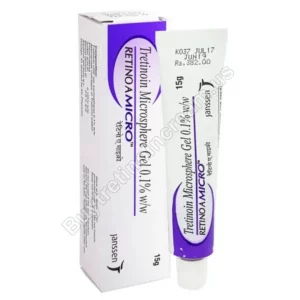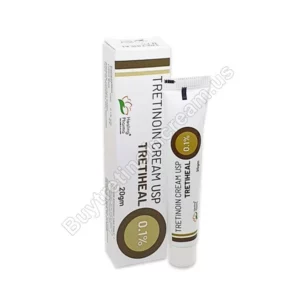
Tretinoin 0.025%
Tretinoin 0.05%
Tretinoin 0.1%
What is Tretinoin Cream?
Tretinoin (Retin-A) is a vitamin A derivative. It is applied topically to the skin to treat mild to moderate acne and skin damage caused by excessive sun exposure. Tretinoin irritates the skin and causes skin cells to grow (divide) and die more quickly, increasing cell turnover. The number of cell layers in the skin is actually reduced.
Tretinoin Cream is formulated at a concentration of 0.1 percent. Tretinoin Cream (0.1 percent, 0.05 percent, and 0.025 percent), as well as Tretinoin Gel (0.05 percent), are topical treatments that are utilized for the management of acne vulgaris.
How Do I Use Tretinoin Cream?
- Effective treatments are available for acne as well as other indicators of aging induced by UV damage with tretinoin cream, which is an excellent topical treatment.
- It has the potential to speed up the cycle of skin cell regeneration and to encourage the production of collagen.
- The surface of the body, specifically the skin, is constantly under attack from various factors.
- Toxins are typically held in place by the decaying and wounded skin that makes up the upper layer.
- In addition, people with delicate skin are more likely to develop sensitivities quickly.
- You may, however, successfully aid in mending trouble spots and rejuvenating the appearance and smoothness of your skin if you were to eliminate the topmost layer and then nourish the progressive layers of new, healthier skin with the essential nutrients. Because of this, Tretinoin 0.1 Percent Lotion has often demonstrated a high level of effectiveness.
Medical uses of the drug
- This medication is acne therapy. It may minimize the number and intensity of acne breakouts and accelerate their recovery.
- Tretinoin is a member of the class of medicines known as retinoids. It operates by influencing skin cell growth.
- This section includes uses of this drug that are not listed in the authorized professional label but may be recommended by your doctor.
- These uses are described as “off-label,” which means they are not mentioned in the authorized professional labeling.
- If your healthcare professional has suggested that you take this drug for a problem discussed in this section, you should only do so.
- This medication is also available in various formulations, some of which are used to improve the look of the epidermis and reduce the impression of creases and acceptable line segments.
- Your doctor may prescribe this medication to address other conditions as well.
How Much Tretinoin Cream to Apply?
- Only take this medication in the manner that your doctor has recommended.
- Please do not use a higher dosage, use it more regularly, or apply it for a prolonged amount of time than what was recommended by your physician. This may irritate your skin.
- This drug should contain a pamphlet. Follow these instructions.
- Do not use it on tanned, windburned, or open sores.
- Don’t apply to the lips, eyes, or nose. When administering, avoid these areas. If it gets there, rinse promptly.
- Before taking Tretinoin, wash your body with a mild cleanser and hot water. Pat dry.
- No washcloths or sponges. Wait twenty minutes before administering this medication to guarantee dry skin. Tretinoin may irritate moist skin.
How Long Should I Continue Applying Tretinoin Cream?
- It is recommended to be used for a limited period, such as several days, to avoid toxicities.
- This is because no long-term data shows what occurs to the epidermis after treatment for more than 48 weeks.
- Within twenty-four weeks of the examination, individuals in one of the trials proceeded to improve.
- This improvement was maintained for a considerable time after the study was finished.
Dosage
- Patients will require different amounts of this drug due to their unique conditions.
- Either follow the directions provided by your doctor or the instructions on the label.
- The information presented here solely pertains to the typical dosages of this drug.
- If your dosage differs from the standard one, you should avoid changing it unless your doctor tells you to.
- The strength of the medication dictates the amount of the drug that should be taken.
- In addition, the condition that is being treated determines the number of daily dosages, the amount of time that passes between doses, and the total amount of time that the medication must be taken.
Overdose
- If you believe someone has consumed too much excess and medication, call the local poison control center or go straight to the emergency hospital and also tell your health care professional.
- Ingestion of this drug could lead to adverse effects. Severe redness, blistering, and severe agony are some of the indications of an overdose.
Missed Dose
- If you fail to consume this pharmaceutical medication one day, take it the minute you remember the next day.
Tretinoin Cream Side Effects
- After applying the medication, you may feel warmth or stinging.
- Some individuals may experience an increase in acne severity, redness, dryness, itching, scaling, and mild burning during the first two to four weeks of therapy.
- Continuous usage usually reduces these problems.
- Rash, itching, swelling, significant dizziness, and trouble breathing can accompany a severe allergic reaction.
How to Store Tretinoin Cream When Not Used
- Keep away from moisture and light at room temperature.
- Avoid heat and fire.
- Do not scream.
- Keep kids and pets away from drugs.
- Unless instructed otherwise, don’t flush or spill medications down a drain.
- Discard the cream when it’s no longer required or has expired.
Tretinoin Cream Warnings and Precautions
- Your doctor must regularly evaluate your progress to ensure the treatment is functioning and to detect side effects.
- Using Tretinoin for the first three weeks may irritate your skin. Acne may worsen before improving. Even daily use may take longer than 12 weeks for your acne to clear up. See a doctor if skin sensitivity worsens or if acne doesn’t resolve in 8–12 weeks.
- Avoid washing tretinoin-treated skin for at least 1 hour.
- Before or after taking Tretinoin, avoid applying topical medications to the same location. Tretinoin may not function or cause skin irritation.
- During the first six months of use, avoid the sun, wind, and cold. During the first 2 or 3 weeks, sunburn, dryness, and irritation are more likely. Stop taking this drug if skin irritation becomes severe.
- Skin treated with this medicine may dry out or get windburned more easily. If you cannot avoid being in the sun and cold weather, use SPF 15 sunscreen or sunblock. Wear protective clothing, a helmet, etc.
Interactions With Tretinoin Cream
Alcohol
Certain drugs can interact with alcohol. Discuss alcohol usage with your doctor.
Pregnancy
It does not affect pregnancy.
Driving
You can use it and drive safely.
Breastfeeding
There are no appropriate studies on nursing moms to determine baby danger. Weigh the advantages and hazards before nursing.
Where Can I Buy Tretinoin Cream Online?
You can buy the product from various online medical stores that stock it. You can also get it from their website and order it online. We sell the product in perfect condition.
Why buy Tretinoin Cream from us?
We will ensure that the product reaches you safely and in the best condition. Ordering from us will save you the extra hassle of browsing through other sites. It will also guarantee you the highest quality products.
FAQS
Can I share the product with others?
Do not share this medication with others. You may use cosmetics. But you need to clean your skin carefully before you apply the cream. Some soaps and cosmetics may aggravate your acne.
What is it mainly used for?
It is used to treat acne, anti-aging, hyperpigmentation, large pores, oiliness, and sun damage.
Tretinoin Cream With Other Medications?
Tretinoin is generally compatible with other medications. To prevent severe irritation and dryness, avoid using facial cleansers, toners, and cosmetics that contain sulfur, salicylic acid, or resorcinol. Never combine Tretinoin with products containing benzoyl peroxide, as they diminish Tretinoin’s effectiveness and can result in dryness.
